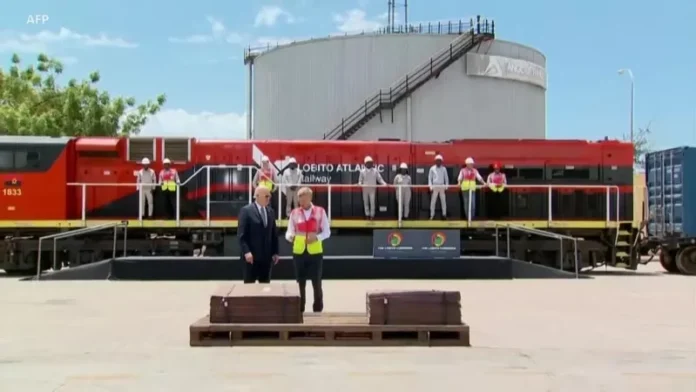In the midst of the scorching heat, at the largest port in Angola, Lobito, U.S. President Joe Biden stood beaming as he shook hands with nine hard-working, smiling individuals. This was no ordinary visit for Biden as he had traveled all the way from Washington to meet these workers at the end of a remarkable 1,300-kilometer rail line that was built with the support of the United States. The rail line allows for the transportation of critical minerals from the remote interior of Africa, and on this December afternoon, it was a symbol of hope for the future of the continent.
Despite the usually bustling port being cleared for Biden’s visit, there was not much activity. However, the nearby rail engine, painted in black and red, and the long chains of blue half-containers behind it, were still shiny and new. According to Biden, this rail line represents Africa’s future and he couldn’t be more right. When he launched this project with the support of his G7 partners last year, he had promised to build a better future for Africa. Today, as he stood at the Lobito port, witnessing the fruits of his investment, he declared that the future is here and now.
The United States has invested approximately $4 billion to renovate the dilapidated Lobito Corridor track, which extends from Zambia, rich in copper, through the mineral-rich Democratic Republic of Congo, all the way to the port of Lobito. This ambitious project aims to reduce the journey time from 45 days by road to just 45 hours by rail when the full route is completed by the end of this decade.
During his visit, Biden announced an additional investment of $600 million to upgrade the rail, develop the corridor, and expand agriculture. While this project may not be as colossal as China’s Belt and Road Initiative, Biden emphasized the United States’ commitment to true partnership with African nations. He stated that the U.S. understands the importance of not only how much but also how it invests in Africa.
The African leaders present at the event, including the presidents of Angola, Congo, and Zambia, as well as the vice president of Tanzania, were enthusiastic about the project and optimistic about its future. Angolan President Joao Lourenco stated that the rail line would be a crucial element for economic development, providing opportunities for small and medium enterprises in the business value chain. He also highlighted the potential for regional integration and economic growth for the Southern Africa Development Community (SADC) and Eastern African region.
President Felix Tshisekedi of the Democratic Republic of Congo, whose country is rich in minerals, also praised the project, stating that it offers more than just a mode of transportation. He highlighted the opportunities for economic transformation and improving the living conditions of citizens.
Experts have noted that this investment is not merely an act of charity. According to E.D. Wala Chabala, an independent economic policy and strategy consultant, both the U.S. and the European Union see access to critical minerals as crucial for the development of the green economy. Without it, they fear being left behind in the global push towards a greener and sustainable economy.
The project also holds great potential for the development of agriculture in Angola. A top Angolan agricultural official, Anderson Jeronimo, expressed his country’s hopes of using this opportunity to one day export higher-value goods to the U.S. through the African Growth and Opportunities Act (AGOA). He also stressed the importance of promoting internal production to meet the country’s food needs, which will enable them to take advantage of opportunities like AGOA in the future.
The visit by President Biden to Lobito, Angola, has not only celebrated the success of the U.S.-funded rail project but has also highlighted the strong partnership between the U.S. and African nations. It has showcased the potential of such collaborations in boosting economic growth, regional integration, and improving the lives of citizens. This project is a testament to the United States’ commitment to supporting Africa’s development and its future. With continued investments and partnerships, the future of Africa looks bright, and the possibilities are endless.

